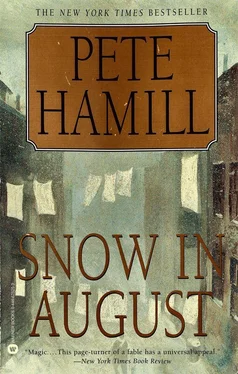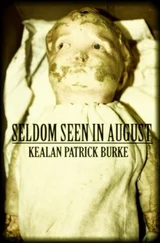“You catched me!” he said.
“Caught,” Michael said.
“You caught me,” the rabbi said. “I want to surprise you, but…” He brandished the horn. “I’m going to be a regular Ziggy Elman!”
Michael looked at the horn. “What is that in your hand?”
The rabbi explained that the instrument was a shofar, a ram’s horn. It was used in ceremonies during the holy days called Rosh Hashanah and was the same kind of horn that Joshua had used in biblical days to flatten the walls of Jericho.
Michael started singing a song he’d heard a lot on the radio:
Joshua fit the battle of Jericho ,
Jericho ,
Jericho .
Joshua fit the battle of Jericho ,
And the walls came tumbling down ….
“Wait, wait!” the rabbi said, signaling with the shofar. “Now, again!”
Michael sang the words more forcefully and the rabbi played a few notes in the thick, plangent tones of the ram’s horn. Joshua fit the battle of Jericho, Jericho, Jericho … The sound of the shofar was fat, primitive, eerie, as if Rabbi Hirsch were reaching back across the centuries. But there was no melody from the horn. It was not mournful. It was not melancholy. It was just loud and brutal, like a foghorn.
When the rabbi finished, he shook his head sadly, his face drained by failure.
“Is impossible,” he said. “A tune you can’t get from a shofar, just a noise. You need—” He pounded his chest as if asking it to identify itself. “What’s the word?”
“Lungs,” Michael said. “So you have enough breath.”
“Yes, yes, lungs.”
He turned the shofar over in his hands.
“Why can’t I make from it music?” he said softly. “Why can’t I make from it joy ?”
Michael could offer no answer.
“Why can’t I make from a shofar like a regular Ziggy Elman?”
Rabbi Hirsch laid the shofar on a shelf of the bookcase and switched on the radio. It was tuned to WHN. Red Barber was explaining that with runners on first and third and none out, the Dodgers were sitting in the catbird seat.
“There’s a bird in America that looks like a cat?” the rabbi asked.
“I don’t know,” Michael said.
“So why does Red Barber say the Dodgers, they are in the catbird seat?”
“He says it all the time, like he says rhubarb .”
The rabbi was flicking through the dictionary.
“Rhubarb? That’s like a fruit I see in Roulston’s grocery store.”
“Red Barber uses it to describe, like, well, a big fight. You know, if a batter gets hit by a pitch and he charges the mound? Or when Leo Durocher comes out to holler at the umpires. That’s a rhubarb. And he says ‘We’re sitting in the catbird seat’ when he means the Dodgers are in good shape. They have the upper hand. They’re sitting pretty. Know what I mean?”
“No.”
The words zipped through Michael’s mind, and he realized what they must sound like to Rabbi Hirsch. Good shape and upper hand and sitting pretty. How did they come to mean what they mean?
“It’s like to have an advantage,” Michael said. “Like, you don’t have to worry now. You can’t lose. You can do it.”
Rabbi Hirsch nodded, as if finally understanding Michael’s fumbling attempts to explain. He went to the bookcase and lifted the horn again.
“If like Ziggy Elman I can play this shofar,” he said, “I am sitting in the catbird seat.”
Michael smiled.
“You said it.”
One Saturday morning a few weeks before Easter, Michael, Sonny, and Jimmy were playing ball against the factory wall on Collins Street. The day was bright but still too cold for a full game of stickball; the other kids remained huddled in their apartments, and there weren’t enough players to choose up sides. But Jimmy had found an old broom in his uncle’s junkpile, and Sonny had saved a spaldeen from the previous summer, and they stripped the straw off the broom and then took turns whacking the ball off the factory wall. Home plate was chalked in front of the wall of O’Malley’s Garage. Each player got ten swings at the ball, then they switched positions. The baseball season wouldn’t begin until April 16. Nobody yet knew whether Jackie Robinson would join the Dodgers. As a Royal, he was now hitting.625 against the big club.
“They gotta bring him up,” Michael said. “How couldn’t they, the way he’s hitting? He goes one-for-three, he’s in a slump.”
“We’ll know real soon,” Sonny said. “Hey, Jimmy, throw me a curveball, you see what I do to it!”
Jimmy kept throwing fastballs to Sonny, who hit every one of them, while Michael moved around as the fielder, retrieving the ball as it bounced off the factory wall. When Sonny finished his ten hits and it was Michael’s turn to bat, he discovered he was hitting the ball harder than he did the previous summer. He knew he was fifteen pounds heavier and two inches taller now, but for some reason he could also see the ball better. He watched the spaldeen leave Sonny’s hand, and it really did get fatter and pinker as it came closer. Every time he swung, he made contact, and the ball rose high against the wall. He was finished quickly: ten pitches, ten hits. As good as Sonny. Then he pitched to Jimmy while Sonny played the field. Jimmy missed four of the ten pitches. And then they switched again. Around noon, a garbage truck wheezed up the street, its gears grinding, and stopped in front of O’Malley’s Garage, blocking home plate. The boys stood around while the sanitation men heaved cans of trash into the truck.
“So what’s the latest up there on Kelly Street?” Sonny said. “You know, the synagogue?”
“I haven’t seen a thing,” Michael said. “I looked and looked,” he lied, “but nothing.”
“So where did the story come from?” Jimmy said.
“Three guys were playing stickball,” Michael said, “and then a sanitation truck got in the way and—”
“Maybe we should go up there some night,” Sonny said in a cold way. “Maybe we can find it.”
“We got more important things to do,” Michael said.
“What’s more important than a fortune of money?”
“The goddamned Falcons, that’s who.”
Sonny gazed around the street. There was no sign of danger on this cold spring day.
“If we had a fortune of money,” Jimmy said, “we could all move to Florida. You could take your mother, Michael, Sonny could take his aunt—”
“Your uncle stays here!” Sonny said.
“You know,” Jimmy said, “if we do go in there some night, the synagogue, we better wait till after Passover. The Jews, during Passover—”
“They kill babies and put the blood in the matzohs?” Michael said sharply.
“Well… yeah.”
Michael thought of Brother Thaddeus and the tunnels in Prague and the Golem and he didn’t want to play ball anymore.
“I gotta go wash the halls,” he said, handing the bat to Sonny, who looked at him in a confused way. Michael drifted away from them toward Ellison Avenue. Thinking: You goddamned idiot, Jimmy. Because of you and your big-mouthed uncle, we have to look over our shoulders when we walk the streets, I’m scared shitless every time I go down the cellar to shovel coal, there’s guys looking at us like they want to cut our goddamned throats, and you believe Jews put blood in the matzohs? Fucking imbecile. I gotta talk straight to them. Gotta. Got to tell them Rabbi Hirsch is a good man. Gotta tell them there’s no treasure. Gotta come clean about what I’m doing there. Gotta gotta. Got to tell Rabbi Hirsch too. Gotta gotta gotta.
He turned into the avenue and then froze. His legs felt heavy, his hands cold. Frankie McCarthy was two blocks away.
Читать дальше












